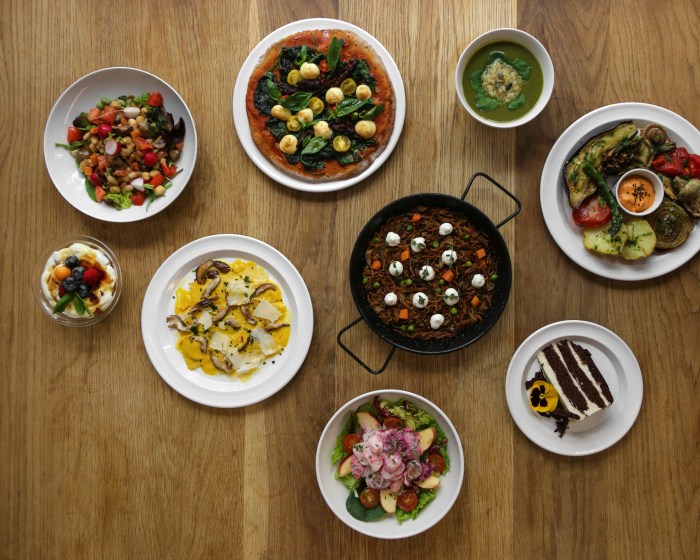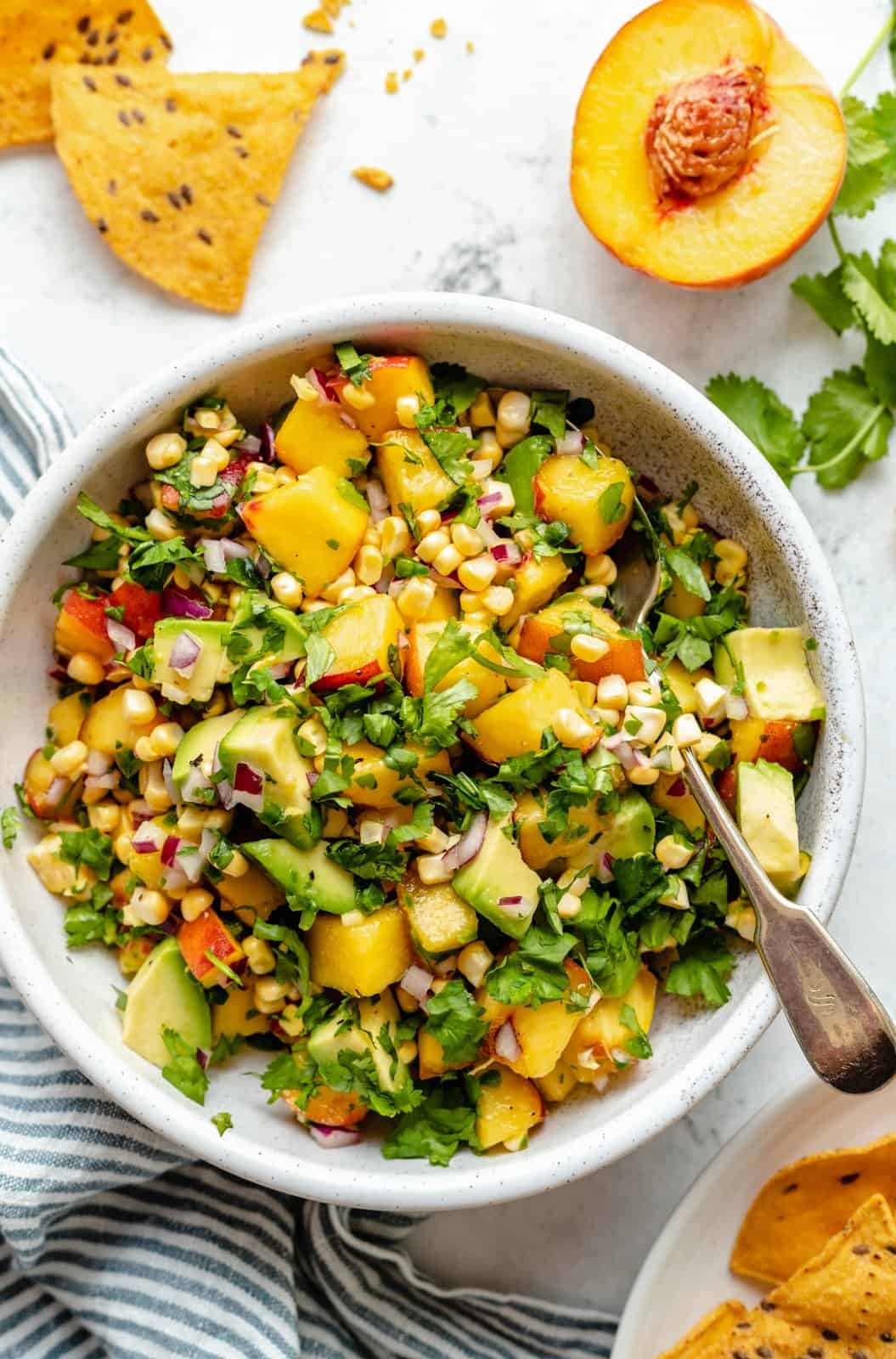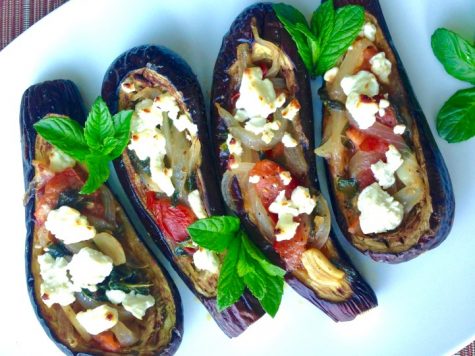When you think of Spanish cuisine, chances are that most of the dishes involve animal products. Known worldwide for their love of ham, fish and cheese, the Spanish didn’t seem particularly welcome to meat-free consumers. For years, vegans had to rely on plates of Padrón peppers, grilled vegetables and patatas bravas (hold the mayo!) to get by in Spain — but things are changing. Like most cosmopolitan cities around the world, Barcelona is experiencing the same transitions, and here the plant-based movement is not only growing but exploding. Here are my picks for the best plant-based restaurants in Barcelona.
FLAX & KALE
Teresa Carles is known throughout Spain as a veggie restaurant pioneer, and her latest Barcelona restaurant has set the bar even higher. Flax & Kale isn’t actually a vegetarian restaurant, it’s ‘flexitarian’: while 80% of the menu is vegetarian or vegan, the remaining 20% contains some form of oily fish, be it cod, salmon or anchovies. There are three Flax & Kale restaurants in Barcelona, although the newest (and, I think, the best) is Flax & Kale Passage, which offers gluten-free vegan pizzas, healthy Asian fusion cuisine and even boasts its very own Kombucha Lab.

Let’s start with the pizza, because it was the pizza that first blew me away. The crux of a good plant-based pizza is usually the “cheese,” but despite its rapidly improving taste and texture, this can still sometimes be hit-or-miss. Not at Flax & Kale. Here I had my first ever vegan four cheese pizza: plant-based cheddar, blue cheese, mozzarella and a Parmesan-style cheese cutely dubbed “parmigiano teresiano.” The cheeses were melted over a bed of San Marzano tomatoes, and it was gooey, creamy, stringy; I just wish I had a slice to present those who laugh at the very idea of vegan pizza. The gluten-free dough was also exceptional: crisp, light and chewy, it’s a blend of whole grain and non-wheat flours.

Also on the menu is “My Vegan Japanese Girlfriend Bowl,” something I ordered just because I loved the name so much. But happily, the dish itself was delicious: black rice and quinoa topped with jackfruit, green soybeans, onions and tomato, and innovative vegan “scrambled eggs” made from ackee. Another standout dish was the “BBQ Pulled Pork Bao,” where tender braised jackfruit perfectly replaced slow-cooked pork; the texture and taste really has to be experienced to be believed. Drizzled with vegan mayonnaise, chilli jam and fresh cilantro, these delightfully squidgy steamed buns were so satisfying that I had to order a second portion.

“Eat better, be happier, live longer” is the motto at Flax & Kale, and after dining here I can confirm that I left feeling very happy indeed – so happy that I’m wondering whether it’s foolish to fly to a different country just to eat at a restaurant there?
RASOTERRA
Tucked away in the narrow streets of Barcelona’s Gothic Quarter, vegetarian bistro Rasoterra is focused on slow food made with seasonal and local produce. On the menu, beside each dish, are denotations telling you which dishes are vegan, which are locally sourced and which are gluten-free. The best way to eat here is to share. You’re advised to choose five small plates between two, and the standout for me was the huitlacoche mushroom and avocado taco with bean cream, picked onion and green pepper. Nicknamed the Mexican truffle due to its earthy, pungent taste, huitlacoche isn’t really a mushroom: it’s actually a fungus that grows on corn, and it’s absolutely delicious.

The spinach croquettes with pine nuts, sultanas and vegan aioli were crispy on the outside and soft and fluffy on the inside, and packed with rich, piquant flavours. Zucchini also features heavily during the summer months, be it in soups, pastas or salads, but the stuffed zucchini flowers are exceptional. This Italian staple has been given a Catalan twist, and locally grown zucchini is steamed til perfectly firm-yet-tender, and their delicate flowers stuffed with parsley and a creamy almond pesto.

Other popular dishes include the Trinxat — a traditional potato and leek mash (with the addition of tempeh), that’s shaped into little cakes, lightly fried and then topped with hot mole and charred cherry tomatoes. Rasoterra is a principled restaurant (it even has its own manifesto: “Behind each of our dishes, behind each and every one of our ingredients, there is a story. Stories about traditions, cultures, places, secrets, arts and crafts. Stories of love, dedication and passion….”) and it’s clear that extreme care is taken with both the preparation of the food and presentation of dishes.

BARCELONETA SANGRIA BAR
You can’t visit Spain and not sip some sangria, and luckily for those following a plant-based diet, one of the best vegan restaurants in town is BarCeloneta Sangria Bar. Just steps away from the beach, this cool bar serves up vegan versions of Spanish tapas, as well as plenty of raw food dishes. The selection of sangria is large, multicoloured and varied, and there’s a great selection of local organic wines, too. The most popular dish is the aromatic plant-based paella, which comes with succulent yet chewy soy-based ‘shrimps and prawns’, artichokes and mushrooms; it’s excellent — and the first time I’ve encountered a paella with mock-meat and not just veggies.

There’s also an array of traditional Catalan tapas that have been veganised: Las croquetas – mushroom croquettes with sun dried tomato sauce, Patatas BarCeloneta – grilled sliced potatoes with romesco sauce and curried lentil cream, and “Langostinos” a la plancha – veggie “langoustines” (made with soy, wheat and konjac) and baby onions in balsamic, grilled with fresh lime and truffle. Another delicious dish was the organic chickpea and tempeh skewers with eggplant and sundried tomatoes, sauteed and seasoned with tomato jam and sesame.

TERESA CARLES
I can’t write about the veggie food scene in Barcelona without including Teresa Carles. As mentioned, Teresa Carles is the brainchild behind Flax & Kale, and the original pioneer of Spain’s vegetarian restaurants, but it was her eponymous restaurant that kicked things off in Barcelona back in 1979. Located in the buzzing El Raval neighbourhood, close to Plaça de Catalunya, today the restaurant is the epitome of modern style, with exposed brickwork, wooden floors, and a stainless-steel station where you can grab quick juices or salads. It’s usually packed out (you’ll need to reserve a table in the evening) and the weekly changing menu includes plenty of vegan options.

The menu is varied: from home-made cakes and pasta dishes to seitan hamburgers, risottos and soups, there’s something for everyone. Favourites include the Teresa Goes to Tokyo Salad, (wakame, cucumber in asazuke, turnip daikon, tofu, mirin, golden sesame and soy), the Red Devil Raviolo (bicollo ravioli stuffed with aubergines and dried tomatoes, layered on baked eggplant towers with a soft leek cream), and tofu marinated with beetroot, mushroom scallops, spinach, wild asparagus, and mushroom and thyme sauce. Many of the vegetarian dishes can be veganized if you ask, and most of the desserts are plant-based: save room for the vegan black forest cake with coconut cream, chocolate pearls and cherry jam.

Selene Nelson is a UK-based food and travel writer. Follow her foodie adventures here.



